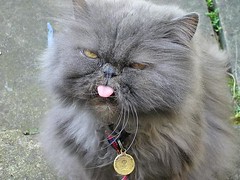One of the things that has always fascinated me about Ender's Game is its portrayal of childhood. My copy of the book starts with an introduction by Orson Scott Card in which he contrasts the reaction of a gifted teacher ("Gifted children just don't talk like that. They just don't think like that.") to the reaction of a group of gifted students ("We are the Enders of today.")
I am inclined to agree with the students. Card depicts children for who they are, not for who adults think they are. Though it may seem unrealistic for 6 and 7-year-olds to be deadly serious about games in the Battleroom, the Battleroom is the only fictional creation. Think of any kid you've seen arguing about the rules of the game (say, hide-and-seek) and whether or not someone cheated. It seems childish to an adult, but that child is taking hide-and-seek as seriously as we would take our midterms.
Card also has some poignant things to say on the nature of childhood. A few times throughout the book, Ender takes some time to wonder what a "real" childhood would be like. He reads through old books and realizes his childhood isn't normal. On page 224, the narration says of Ender, "He was a soldier, and if anyone had asked him waht he wanted to be when he grew up, he wouldn't have known what they meant." After the war is over, and everyone is standing around wondering what they'll do next, the following exchange occurs (page 304):
"'We're kids,' said Petra. 'They'll probably make us go to school. It's a law. You have to go to school till you're seventeen.'
They all laughed at that. Laughed until tears streamed down their faces."
For me, these are some of the most poignant moments of the book. They show how war and stress and work can ruin the innocence of childhood and how fast children can grow into adults. It's not just an element to a work of fiction, either: in 2006 the UN estimates that more than 250,000 children are actively involved in armed conflict, some as young as nine (source). And though fighting in an army or militia is certainly the most dramatic way of forcing children to become adults, it's doubtful that the estimated 246 million children engaged in child labour, some as young as five (source), have retained that innocence of childhood that we so value.
Ender, along with Petra, Bean, Alai, Shen, and all the other children of the Battle School, can't really be considered children. And I think Card presents a completely accurate picture of how they play to beat the system - be the best and no one can ignore you, try to make the right friends in the right way and work to keep your enemies from hurting you. The way it's played out reflects a fictional setting and hyperintelligent characters; yet, I can relate to their struggles, and I'm sure most people in this honors class feel the same way.
Subscribe to:
Post Comments (Atom)

3 comments:
I agree with your assessment completely, I didn't find the way in which the kids in battle school acted to be unbelievable at all. It certainly wasn't all battle and strategy, as they spend plenty of time worrying about the things real kids worry about, like calling eachother names and finding friends. Not to mention that the IF is not just looking for genius kids in the battle school, but those with a very specific dispisition. Peter and Valentine were smarter than most of the other children Ender meets, yet they weren't up to muster by the standards of the IF. Clearly, they look for kids with a certain predisposition to strategic and military thinking, and it's not at all inplausible that this would be the way they spoke to eachother and thought.
When you're a kid you really do feel like you're much more mature and much older than you actually are--at least I did. At ten, one thinks one is as capable as a fifteen year old, until one gets to eleven and learns that perhaps that was not the case. Kids have no real concept of boundaries until one tells them otherwise, and their creativity is strong because they have not yet had it limited by conformity. I guess I think kids are capabale for much more than adults give them credit for. Perhaps saving the world is a bit of a stretch, but then again...maybe it isn't.
One more thought--regarding what you said about gifted children:
This reminds me of much of my childhood because my mother was very much an advocate of challenge in the classroom and having special programs not just for disabled children, but for gifted ones as well. I truly think that in this regard, many teachers hurt more than help by not believing in the abilities of gifted students. It is unfortunate that they are in a position where their prejudices and limitaton limit others' accress to truly challenging education. I would say that in order for the US to be competitive in this world (which we need to start worrying about--schools are slipping and we're falling behind other countries in this area...scary when you live in a country known for "innovation", which requires an educated, creative workforce), more money should be put into gifted education because it is these children who need to harness theirfull potential rather than sitting in a class for others their age and learning math that's probably two years behind what they're capable of.
Post a Comment